- Home
- Wendell Berry
Bringing It to the Table: On Farming and Food
Bringing It to the Table: On Farming and Food Read online
Table of Contents
Title Page
Introduction
PART I - FARMING
Nature as Measure
Stupidity in Concentration
I. CONFINEMENT, CONCENTRATION, SEPARATION
II. FACTORY FARMS VERSUS FARMS
III. SUSTAINABILITY
Agricultural Solutions for Agricultural Problems
A Defense of the Family Farm
Let the Farm Judge
Energy in Agriculture
Conservationist and Agrarian
Sanitation and the Small Farm - (1971)
Renewing Husbandry
PART II - FARMERS
Seven Amish Farms
A Good Farmer of the Old School
Charlie Fisher
A Talent for Necessity
Elmer Lapp’s Place
THE COMMERCIAL PATTERN
THE PATTERN OF SUBSISTENCE
THE PATTERNS OF SOIL HUSBANDRY
TWO KINDS OF HORSEPOWER
A WELL-PLANNED BARN
THE ECOLOGICAL PATTERN
ON The Soil and Health
Agriculture from the Roots Up
PART III - FOOD
AUTHOR’S NOTE
FROM That Distant Land
FROM Hannah Coulter
FROM Andy Catlett
FROM “Misery”
FROM The Memory of Old Jack
FROM Jayber Crow
FROM Hannah Coulter
The Pleasures of Eating
ABOUT THE AUTHOR
Copyright Page
OTHER BOOKS OF ESSAYS BY WENDELL BERRY
Another Turn of the Crank
The Art of the Commonplace
Citizenship Papers
A Continuous Harmony
The Gift of Good Land
Harlan Hubbard: Life and Work
The Hidden Wound
Home Economics
Life Is a Miracle
Long-Legged House
Recollected Essays: 1965-1980
Sex, Economy, Freedom and Community
Standing by Words
The Unforeseen Wilderness
The Unsettling of America
The Way of Ignorance
What Are People For?
INTRODUCTION
by Michael Pollan
A FEW WEEKS AFTER Michelle Obama planted an organic vegetable garden on the South Lawn of the White House in March 2009, the business section of the Sunday New York Times published a cover story bearing the headline “Is a Food Revolution Now in Season?” The article, written by the paper’s agriculture reporter, said that “after being largely ignored for years by Washington, advocates of organic and locally grown food have found a receptive ear in the White House.”
Certainly these are heady days for people who have been working to reform the way Americans grow food and feed themselves—the “food movement” as it is now often called. Markets for alternative kinds of food—local and organic and pastured—are thriving, farmers’ markets are popping up like mushrooms, and for the first time in more than a century the number of farmers tallied in the Department of Agriculture’s census has gone up rather than down. The new secretary of agriculture has dedicated his department to “sustainability” and holds meetings with the sorts of farmers and activists who not many years ago stood outside the marble walls of the USDA holding signs of protest and snarling traffic with their tractors. Cheap words, you might say, and it is true that, so far at least, there have been more words than deeds, but some of those words are astonishing. Like these: Shortly before his election, Barack Obama told a reporter for Time that “our entire agricultural system is built on cheap oil” and went on to connect the dots between the sprawling monocultures of industrial agriculture and, on the one side, the energy crisis and, on the other, the health care crisis.
I have no idea if Barack Obama has ever read Wendell Berry, but Berry’s thinking had found its way to his lips.
Americans today are having a national conversation about food and agriculture that it would have been impossible to imagine even a few short years ago. To many Americans it must sound like a brand-new conversation, with its bracing talk about the high price of cheap food, or the links between soil and health, or the impossibility of a society eating well and being in good health unless it also farms well. But to read the essays in this sparkling anthology, many of them dating back to the 1970s and 1980s, is to realize just how little of what we are saying and hearing today Wendell Berry hasn’t already said, bracingly, before.
And in that “we” I most definitely, and somewhat abashedly, include myself. I challenge you to find an idea or insight in my own recent writings on food and farming that isn’t prefigured (to put it charitably) in Berry’s essays on agriculture. There might be one or two in there somewhere, but I must say that reading and rereading these essays has been a deeply humbling experience.
It has also been a powerful reminder that the national conversation now unfolding around the subject of food and farming really began back in the 1970s, with the work of Berry and a small handful of his contemporaries, including Francis Moore Lappé, Barry Commoner, and Joan Gussow. All four of these writers are supreme dot connectors, deeply skeptical of reductive science, and far ahead not only in their grasp of the science of ecology but in their ability to actually think ecologically: to draw lines of connection between a hamburger and the price of oil, or between the vibrancy of life in the soil and the health of the plants and animals and people eating from that soil.
I would argue that the conversation got under way in earnest in 1971, when Berry published an article in The Last Whole Earth Catalogue introducing Americans to the work of Sir Albert Howard, the British agronomist whose thinking had deeply influenced Berry’s own since he first came upon it in 1964. Indeed, much of Berry’s thinking about agriculture can be read as an extended elaboration of Howard’s master idea that farming should model itself on natural systems such as forests and prairies, and that scientists, farmers, and medical researchers need to reconceive “the whole problem of health in soil, plant, animal and man as one great subject.” No single quotation appears more often in Berry’s writing than that one, and with good reason: It is manifestly true (as even the most reductive scientists are coming to recognize) and, as a guide to thinking through so many of our problems, it is inexhaustible.
That same year, 1971, Lappé published Diet for a Small Planet, which linked modern meat production (and in particular the feeding of grain to cattle) to the problems of world hunger and the environment. Later in the decade, Commoner implicated industrial agriculture in the energy crisis, showing us just how much oil we were eating when we ate from the industrial food chain; and Gussow explained to her nutritionist colleagues that the problem of dietary health could not be understood without reference to the problem of agriculture. Looking back on this remarkably fertile body of work, which told us all we needed to know about the true cost of cheap food and the value of good farming, is to register two pangs of regret, one personal, the other more political: first, that as a young writer coming to these subjects a couple of decades later, I was rather less original than I had thought; and second, that as a society we failed to heed a warning that might have averted or at least mitigated the terrible predicament in which we now find ourselves.
For what would we give today to have back the “environmental crisis” that Berry wrote about so prophetically in the 1970s, a time still innocent of the problem of climate change? Or to have back the comparatively manageable public health problems of that period, before obesity and type 2 diabetes became “epidemic”? (Most experts date the obesity
epidemic to the early 1980s.)
But history will show that we failed to take up the invitation to begin thinking ecologically. As soon as oil prices subsided and Jimmy Carter was rusticated to Plains, Georgia (along with his cardigan, thermostat, and solar panels), we went back to business—and agribusiness—as usual, carelessly dropping the thread of the conversation that Berry had helped to start. In the mid-1980s, Ronald Reagan removed Carter’s solar panels from the roof of the White House, and the issues that Berry and the others were raising were pushed to the margins of national politics and culture. I worked as an editor at Harper’s Magazine during the 1980s, and occasionally published Berry’s speeches and essays. During the Reagan years Berry was often regarded, at least in the Manhattan media precincts I inhabited, as a “Luddite” and a “crank” and generally as something of a literary and philosophical antique. At a time when everyone else was trading in their typewriters for personal computers, I published his short essay about his refusal to use a typewriter that elicited howls of derision from readers. In those days even the word “agriculture” felt hopelessly out-of-date, something that a culture consumed with the idea of post-modernism had exactly no use for.
In fact when I began writing about agriculture in the late ’80s and ’90s, I quickly figured out that no editor in Manhattan thought the subject timely or worthy of his or her attention, and that I would be better off avoiding the word entirely and talking instead about food, something people then still had some use for and cared about, yet oddly never thought to connect to the soil or the work of farmers.
It was during this period that I began reading Berry’s work closely—avidly, in fact, because I found in it practical answers to questions I was struggling with in my garden. I had begun growing a little of my own food, not on a farm but in the backyard of a second home in the exurbs of New York, and had found myself completely ill-prepared, especially when it came to challenges posed by critters and weeds. An obedient child of Thoreau and Emerson (both of whom mistakenly regarded weeds as emblems of wildness and gardens as declensions from nature), I honored the wild and kept from fencing off my vegetables from the encroaching forest. I don’t have to tell you how well that turned out. Thoreau did plant a bean field at Walden, but he couldn’t square his love of nature with the need to defend his crop from weeds and birds, and eventually he gave up on agriculture. Thoreau went on to declare that “if it were proposed to me to dwell in the neighborhood of the most beautiful garden that ever human art contrived, or else of a dismal swamp, I should certainly decide for the swamp.” With that slightly obnoxious declaration American writing about nature all but turned its back on the domestic landscape. It’s not at all surprising that we got better at conserving wilderness than at farming and gardening.
It was Wendell Berry who helped me solve my Thoreau problem, providing a sturdy bridge over the deep American divide between nature and culture. Using the farm rather than the wilderness as his text, Berry taught me I had a legitimate quarrel with nature—a lover’s quarrel—and showed me how to conduct it without reaching for the heavy artillery. He relocated wildness from the woods “out there” (beyond the fence) to a handful of garden soil or the shoot of a germinating pea, a necessary quality that could be not just conserved but cultivated. He marked out a path that led us back into nature, no longer as spectators but as full-fledged participants. I battened on every word of his I could find, and to me his words felt anything but antique—indeed, they were fully as alive, and useful, as any writing can be.
Obviously much more is at stake here than a garden fence. My Thoreau problem is another name for the problem of American environmentalism, which historically has had much more to say about leaving nature alone than about how we might use it well. To the extent that we’re finally beginning to hear a new, more neighborly conversation between American environmentalists and American farmers, not to mention between urban eaters and rural food producers, Berry deserves much of the credit for getting it started with sentences like these:Why should conservationists have a positive interest in . . . farming? There are lots of reasons, but the plainest is: Conservationists eat. To be interested in food but not in food production is clearly absurd. Urban conservationists may feel entitled to be unconcerned about food production because they are not farmers. But they can’t be let off so easily, for they are farming by proxy. They can eat only if land is farmed on their behalf by somebody somewhere in some fashion. If conservationists will attempt to resume responsibility for their need to eat, they will be led back fairly directly to all their previous concerns for the welfare of nature. (“Conservationist and Agrarian,” 2002)
That we are all implicated in farming—that, in his now-famous formulation, “eating is an agricultural act”—is perhaps Berry’s signal contribution to the rethinking of food and farming under way today, and in style as well as content this stands as a classically Berry-esque idea: at once perfectly obvious and completely arresting. To read these essays is to feel that way over and over again, to be somehow stopped in your tracks by the plainly self-evident. Here are a few more such ideas that await you in the pages ahead:We have been winning, to our inestimable loss, a competition against our own land and our own people. At present, what we have to show for this “victory” is a surplus of food. But this is a surplus achieved by the ruin of its sources. ( “Nature as Measure,” 1989)
“Sustainable agriculture” . . . refers to a way of farming that can be continued indefinitely because it conforms to the terms imposed upon it by the nature of places and the nature of people. (“Stupidity in Concentration,” 2002)
Here we come to the heart of the matter—the absolute divorce that the industrial economy has achieved between itself and all ideals and standards outside itself. (“A Defense of the Family Farm,” 1986)
This old sun-based agriculture was fundamentally alien to the industrial economy; industrial corporations could make relatively little profit from it. . . . [But] as farmers became more and more dependant on fossil fuel energy, a radical change occurred in their minds. Once focused on biology, the life and health of living things, their thinking now began to focus on technology and economics. Credit, for example, became as pressing an issue as the weather. (“Energy in Agriculture,” 1979)
Does the concentration of production in the hands of fewer and fewer big operators really serve the ends of cleanliness and health? Or does it make easier and more lucrative the possibility of collusion between irresponsible producers and corrupt inspectors? (“Sanitation and the Small Farm,” 1977)
There is, then, a politics of food that, like any politics, involves our freedom. We still (sometimes) remember that we cannot be free if our minds and voices are controlled by someone else. But we have neglected to understand that we cannot be free if our food and its sources are controlled by someone else. . . . One reason to eat responsibly is to live free. (“The Pleasures of Eating,” 1989)
The adjective “prophetic” is often attached to Berry’s nonfiction, and while I can understand why people would use the word—he has done an unerring job over the past forty years of showing us precisely where the errors of our ways will lead—his prose never screams or squints in rage. It is always as patient and logical, as plumb and square and scrupulous, as well-planed woodwork. I have learned as much from the construction of his sentences as I have from the construction of his ideas. In my study Berry’s books sit on the short shelf I reach for whenever I get tangled in a sentence; reading a few lines at random will often do the trick, break the knot. To enact that unmistakable voice in one’s head is to administer a tonic strong enough to freshen thought and expression both and, at its best, to scrub the crud of received opinion from our everyday thoughtless thinking.
Let me leave you with one very recent example of Berry at his best, drawn from an op-ed piece that he published (with his old friend and collaborator Wes Jackson) shortly after the economy crashed in the fall of 2008.
For 50 or 60 years, we have let ourselves
believe that as long as we have money we will have food. This is a mistake. If we continue our offenses against the land and the labor by which we are fed, the food supply will decline, and we will have a problem far more complex than the failure of our paper economy. The government will bring forth no food by providing hundreds of billions of dollars to the agribusiness corporations.
I like this passage for its idea—the phrase “paper economy” alone is worth a million words of commentary on the financial crisis—but even more for the very happy news it brings: that this indispensable voice is still out there addressing us in our time of need, and remains as bracing as ever.
PART I
FARMING
Nature as Measure
(1989)
I LIVE IN A part of the country that at one time a good farmer could take some pleasure in looking at. When I first became aware of it, in the 1940s, the better land, at least, was generally well farmed. The farms were mostly small and were highly diversified, producing cattle, sheep, and hogs, tobacco, corn, and the small grains; nearly all the farmers milked a few cows for home use and to market milk or cream. Nearly every farm household maintained a garden, kept a flock of poultry, and fattened its own meat hogs. There was also an extensive “support system” for agriculture: Every community had its blacksmith shop, shops that repaired harness and machinery, and stores that dealt in farm equipment and supplies.
Now the country is not well farmed, and driving through it has become a depressing experience. Some good small farmers remain, and their farms stand out in the landscape like jewels. But they are few and far between, and they are getting fewer every year. The buildings and other improvements of the old farming are everywhere in decay or have vanished altogether. The produce of the country is increasingly specialized. The small dairies are gone. Most of the sheep flocks are gone, and so are most of the enterprises of the old household economy. There is less livestock and more cash-grain farming. When cash-grain farming comes in, the fences go, the livestock goes, erosion increases, and the fields become weedy.

 The Selected Poems of Wendell Berry
The Selected Poems of Wendell Berry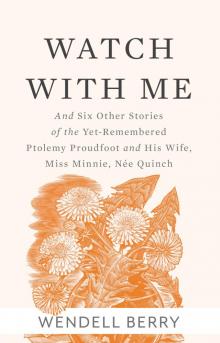 Watch With Me
Watch With Me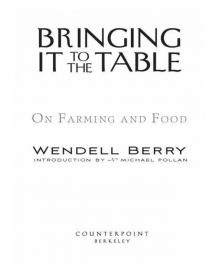 Bringing It to the Table: On Farming and Food
Bringing It to the Table: On Farming and Food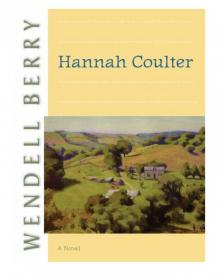 Hannah Coulter
Hannah Coulter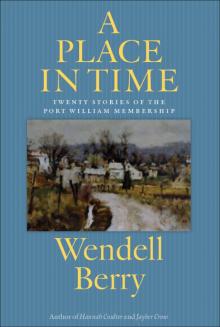 A Place in Time: Twenty Stories of the Port William Membership
A Place in Time: Twenty Stories of the Port William Membership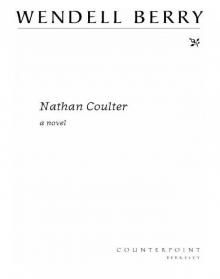 Nathan Coulter
Nathan Coulter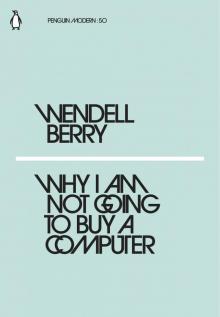 Why I Am Not Going to Buy a Computer
Why I Am Not Going to Buy a Computer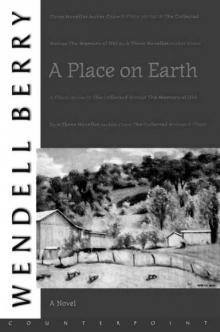 A Place on Earth
A Place on Earth Remembering
Remembering New Collected Poems
New Collected Poems A World Lost
A World Lost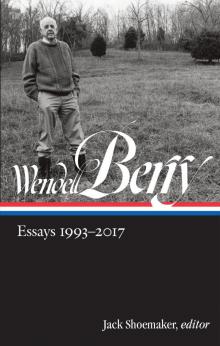 Wendell Berry
Wendell Berry A World Lost: A Novel (Port William)
A World Lost: A Novel (Port William)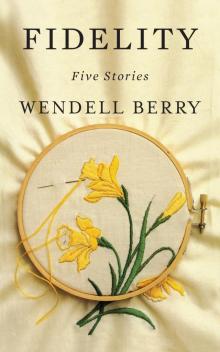 Fidelity
Fidelity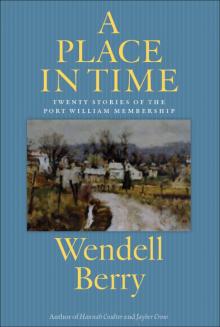 A Place in Time
A Place in Time